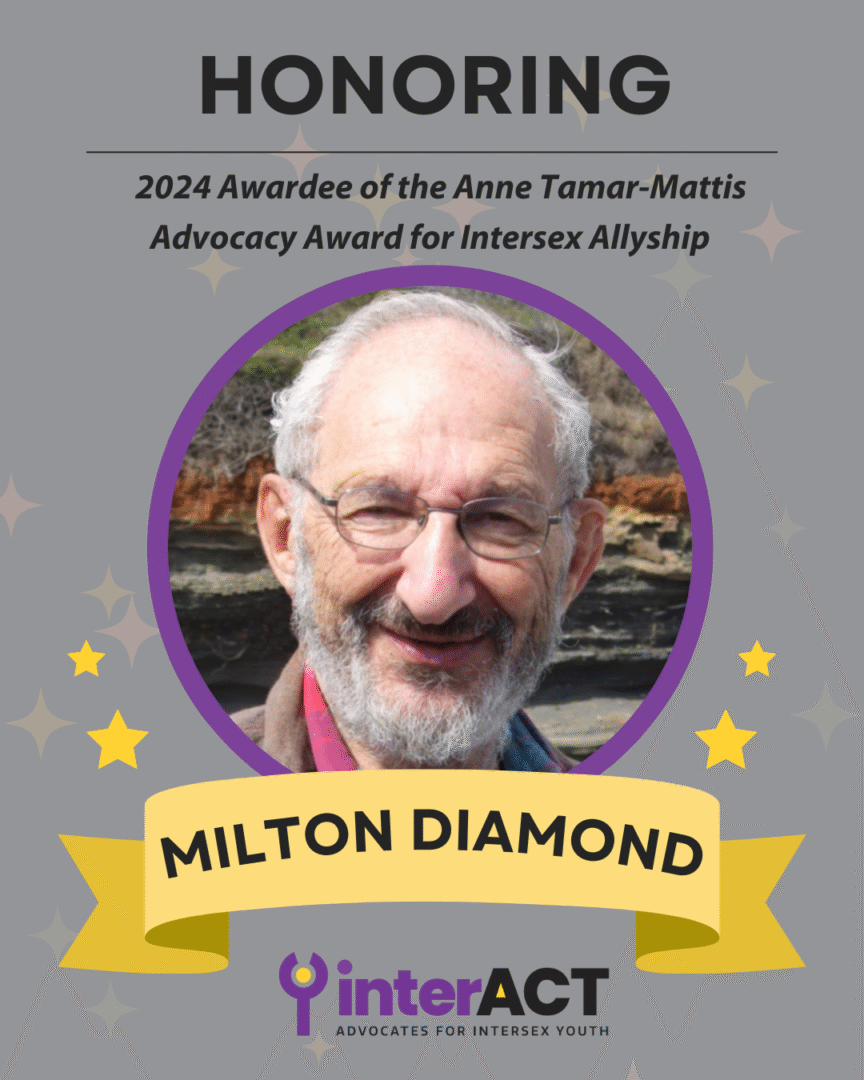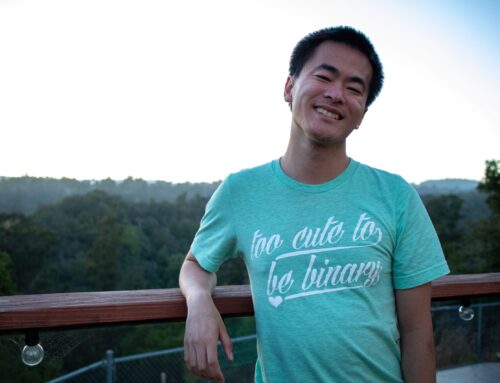Dr. Milton “Mickey” Diamond is the newest recipient of the Anne Tamar-Mattis Advocacy Award for Intersex Allyship, remembering him as a champion for the bodily autonomy of intersex children.
interACT is honored to present the 2024 Anne Tamar-Mattis Award for Intersex Allyship posthumously to Dr. Milton “Mickey” Diamond. Dr. Diamond, Professor Emeritus of Anatomy and Reproductive Biology at the University of Hawaiʻi at Mānoa at the John A. Burns School of Medicine in Honolulu, Hawaiʻi, was a leading expert in psychology, biology, and sexology. He was also a legendary advocate for children with genital differences, and ultimately debunked the legitimacy of the early genital surgery model.
To understand the momentous impact of Dr. Diamond’s work, one must understand his battle against this model and another sexologist named John Money. As Dr. Diamond’s career took off, Money of Johns Hopkins University proposed the early genital surgery model, claiming that gender is malleable and children can adopt any gender identity with which they are raised. In 1967, Money was consulted by the parents of a boy, Bruce Reimer (later known as David) whose penis had accidentally been harmed during circumcision in 1965. In the now-infamous case, Money advised that the child be raised as a girl, with surgeries to alter his body accordingly. The child and his twin brother were studied by Money for several years. In the 1970s, Money began to claim the “success” of his theory: David was purportedly successfully raised as a girl.
The case of David Reimer and Money’s theory had a cascading effect. The fields of medicine, psychology, sociology, and women’s studies used the case to support the contention that gender roles and gender identity are not inborn (“nature”) but learned by an environment that conditioned gender (“nurture”). And while David was not intersex, Money used David as both an unethical experiment and a justification for surgery on children with genital differences.

As a result, these devastating practices are performed by pediatric physicians to this day, many of whom perceive “vaginoplasty and clitoroplasty before age 2 years” as “preferable options.” The other crucial aspect of Money’s theory was hiding or “concealing” the truth about the person’s intersex traits and keeping past surgeries hidden from them.
Dr. Diamond disagreed with Money’s theories of early surgery and concealment. His studies of clinical cases, hormones, the imprinting phenomenon, and learning theory led him to conclude that, although gender identity was not necessarily explicit at birth, it is present at an early age in the form of a built-in nervous system “bias” with which the individual interacts with their environment. Dr. Diamond published on the subject between 1965 and 1979. When a BBC team sought to interview Money for a documentary on the case, they invited Dr. Diamond to be a consultant on the program to present an opposing view.
BBC interviewed the team of psychiatrists working with Reimer, who, still a teenager, was not identified for the program, which first aired in 1980 in the UK. The program made it clear that the sex reassignment had been a complete failure, despite Money’s claim of success. David–who struggled against being a girl from the start–was told the truth by his parents at the age of 14. He reclaimed his male gender identity and took the name David Reimer. David began surgical and hormonal treatment to reverse the misassignment.
Dr. Diamond spent considerable effort locating and identifying Reimer to talk to him. He wanted to establish the falsity of Money’s claims and get David’s permission to tell his story. Dr. Diamond aimed to dissuade doctors from operating on children with genital differences. In 1994, he located David (then a married man in his late 20s), who agreed to publish his story.
Dr. Diamond, along with Reimer’s psychiatrist H. Keith Sigmundson, M.D., published a clear account of the truth behind the case in 1997. It took a long time to find a journal willing to publish the controversial paper, which described David’s case with David anonymized as John/Joan. The publication featured a comprehensive set of guidelines recommended to the doctors and parents dealing with infants with genital variations, strongly advising against early genital surgery for cosmetic reasons. Diamond further worked with Dr. Kenneth Kipnis, a philosopher-ethicist, to publish clear recommendations in 1998, including a general moratorium on surgery done without the patient’s consent.
Dr. Diamond continued to study the development of psychosexual differences in response to hormonal actions on the fetus, concluding that successful adjustment to a gender role at odds with sex anatomy takes place only where the individual firmly considers themselves to be of a different gender than the one they were assigned at birth. Studies showed that children, from a very early age, compare themselves to others and become aware that they are like or unlike the standard groups of males or females, long before they have any awareness of differences of genitalia. If, as they grow, they discover that the gender they feel is different from that which their parents and others assign to them, they are likely to declare very firmly that they disagree with that assignment.
The work of Dr. Diamond inspired others in the field to undertake further research and increase pressure in this area. In 2013, the United Nations Special Rapporteur on Torture issued a statement calling for an end to genital-normalizing surgeries without the consent of the individual.
Dr. Diamond will be remembered as a champion for bodily autonomy for intersex children and all children with genital variations. interACT could not present this award to a more deserving medical ally, researcher of the highest ethics, and committed fighter for the rights of intersex children.
Dr. Diamond’s wife, Dr. Constance Brinton-Diamond, accepted the award on his behalf, telling interACT, “Mickey would feel truly honored by your recognition of his life-long work defending the rights of intersex persons and other sexual/gender minorities. He is well known for his statement: ‘Nature loves variety, but Society hates it’.”






